January 11-13, 2019
St. Regis Abu Dhabi on the Corniche, Abu Dhabi, United Arab Emirates
Saturday, January 12
OPENING REMARKS
Frederick Kempe, President and CEO, Atlantic Council
GEN James L. Jones, Jr. USMC (Ret.), Executive Chairman Emeritus, Atlantic Council
H.E. Dr. Sultan Al Jaber, Minister of State, United Arab Emirates and Chief Executive Officer, Abu Dhabi National Oil Company
H.E. Suhail Al Mazrouei, Minister of Energy and Industry, United Arab Emirates
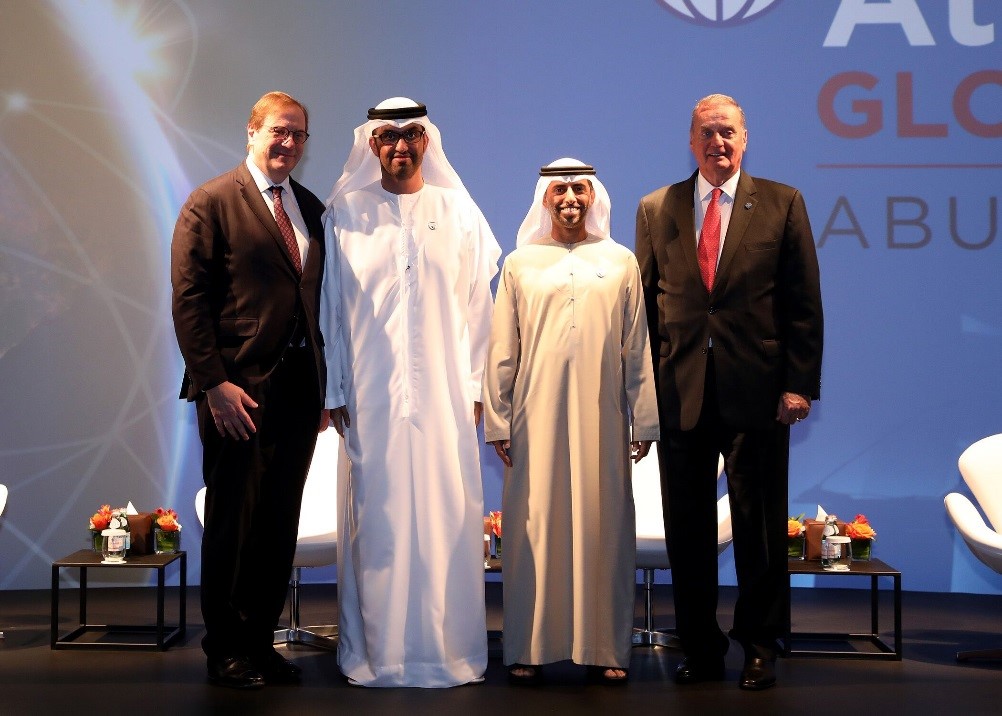
Frederick Kempe opened the forum with three central themes: the future of oil, digitalization of the energy industry, and country and company diversification. Exemplifying the application of these themes, the keynote speakers cited Oil and Gas 4.0 as a means to open new opportunities for natural gas, artificial intelligence (AI), and energy resilience.
SCENE SETTER: NEW ENERGY TECHNOLOGIES AND NEW ENERGY GEOPOLITICS
The Hon. Ernest Moniz, President and CEO, Energy Futures Initiative; former Secretary, US Department of Energy
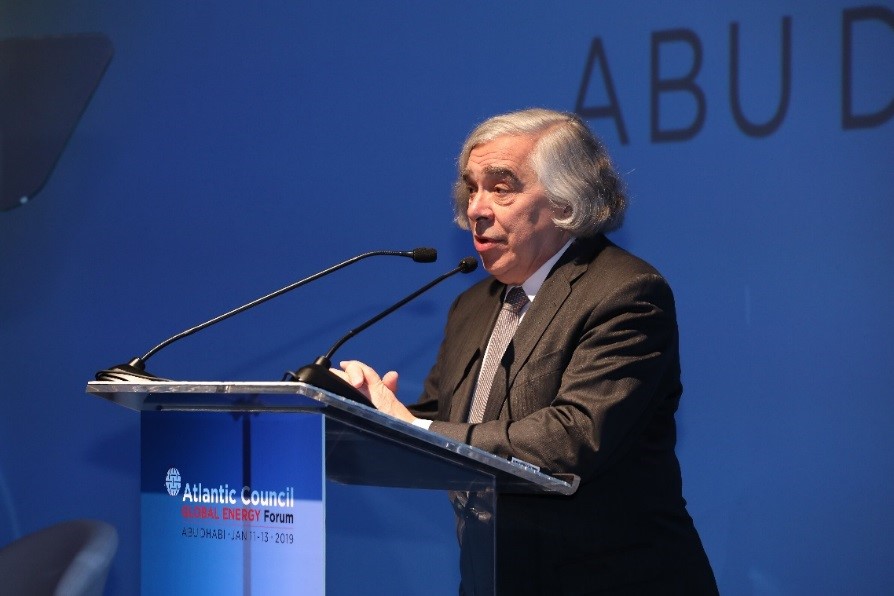
Explaining the requirements of the energy transition, Ernest Moniz called for collaboration between policy, tech, and business communities and innovation in oil and gas in addition to clean and advanced energy. He cited plummeting solar costs, advanced nuclear technology, and carbon capture and sequestration technology as drivers of this transition.
SETTING THE ENERGY AGENDA FOR 2019
H.E. Suhail Al Mazrouei, Minister of Energy and Industry, United Arab Emirates
Lisa Davis, CEO Energy and Member of the Managing Board, Siemens AG
Brian Hook, US Special Representative for Iran and Senior Policy Advisor to the Secretary of State, US Department of State
Majid Jafar, Chief Executive Officer, Crescent Petroleum
Moderated by: Hadley Gamble, Reporter and Anchor, CNBC
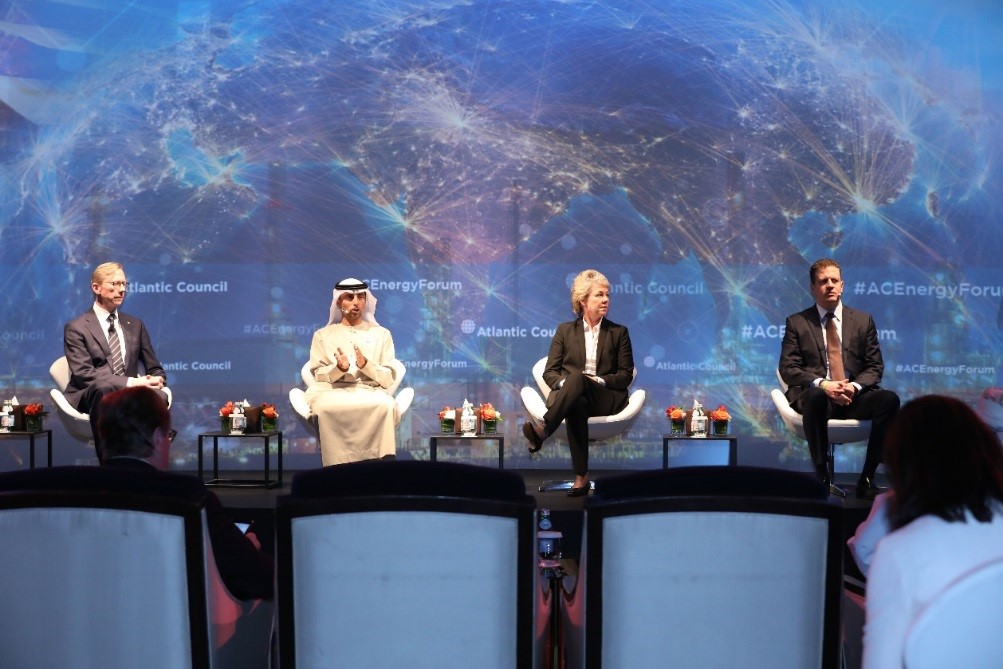
China and Iran dominated the conversation about the geopolitical drivers of the 2019 energy agenda. Panelists agreed that China’s leadership on new energy technology served as a driving force of global sustainability, industry digitalization, and clean energy research and development. Despite advancement in non-fossil fuel technologies, the continued significance of oil markets ensured that Iran’s attempts to evade sanctions would take center stage in any conversation at the intersection of energy and geopolitics.
INNOVATION PRESENTATION: THE DIGITAL TRANSFORMATION OF THE OIL SECTOR
Abdul Nasser Al Mughairbi, Senior Vice President, Digital, ADNOC Group
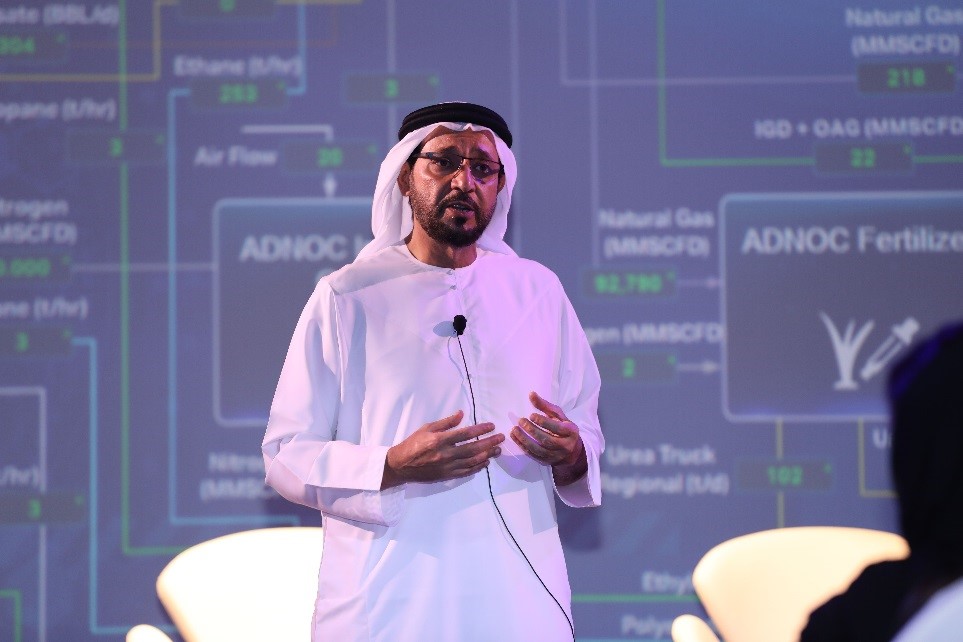
To avoid become obsolete, Abdul Nasser Al Mughairbi asserted, oil companies must adapt new data analytic techniques and artificial intelligence (AI). Technologies like integrated AI and blockchain had enormous potential to improve real time data capture, monitor pollution, and drive efficiency through system-wide integration.
MEETING ASIAN ENERGY DEMAND
Yongsung Cho, President, Korea Energy Economics Institute
Anatol Feygin, Executive Vice President and Chief Commercial Officer, Cheniere Energy
David Hobbs, Senior Fellow, Global Energy Center, Atlantic Council
Wang Zhongying, Director General, Energy Research Institute, National Development and Reform Commission
Moderated by: Jennifer Gnana, Energy Reporter, The National
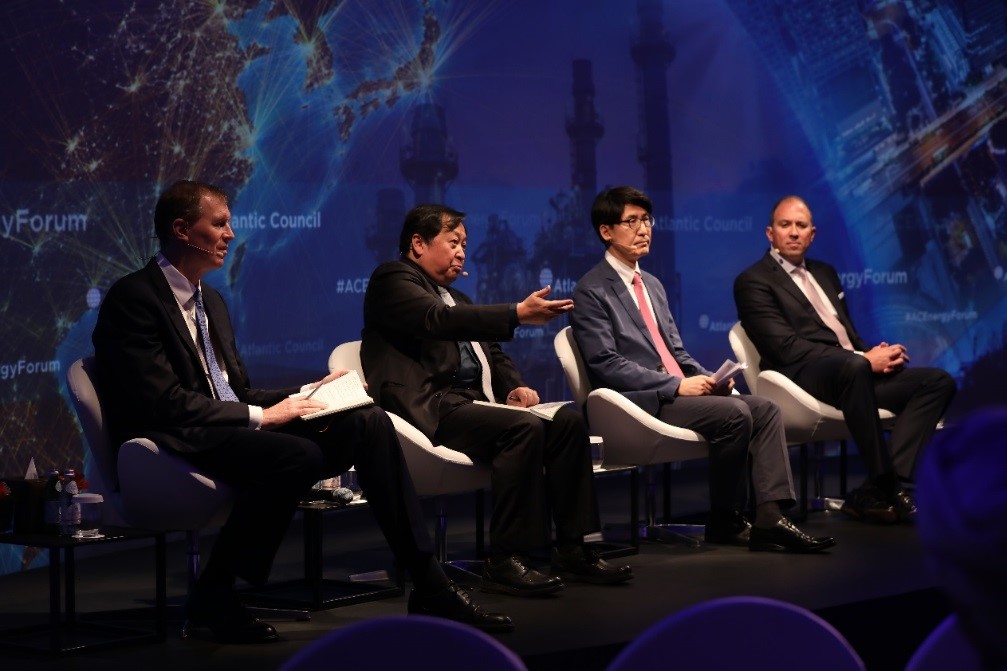
To address the dual challenge of growing energy demand and decarbonization, Asian countries must approach the energy transformation with an eye toward storage and advanced technology. Panelists extoled China’s progress in renewables investment but debated the extent to which financial incentives should prioritize clean energy and LNG adoption over fossil fuels, especially in the absence of financially viable solutions to the seasonal variance of wind and solar.
BREAKOUT SESSIONS
REPORT LAUNCH 1: SOVEREIGN INVESTORS: A MEANS FOR ECONOMIC DIVERSIFICATION?
Mark Cutis, Chief Financial Officer, Abu Dhabi National Oil Company
Michael Greenwald, Senior Vice President, Tiedemann Advisors; Senior Advisor to the President and CEO, Atlantic Council
Moderated by: Bina Hussein, Associate Director, Global Energy Center, Atlantic Council
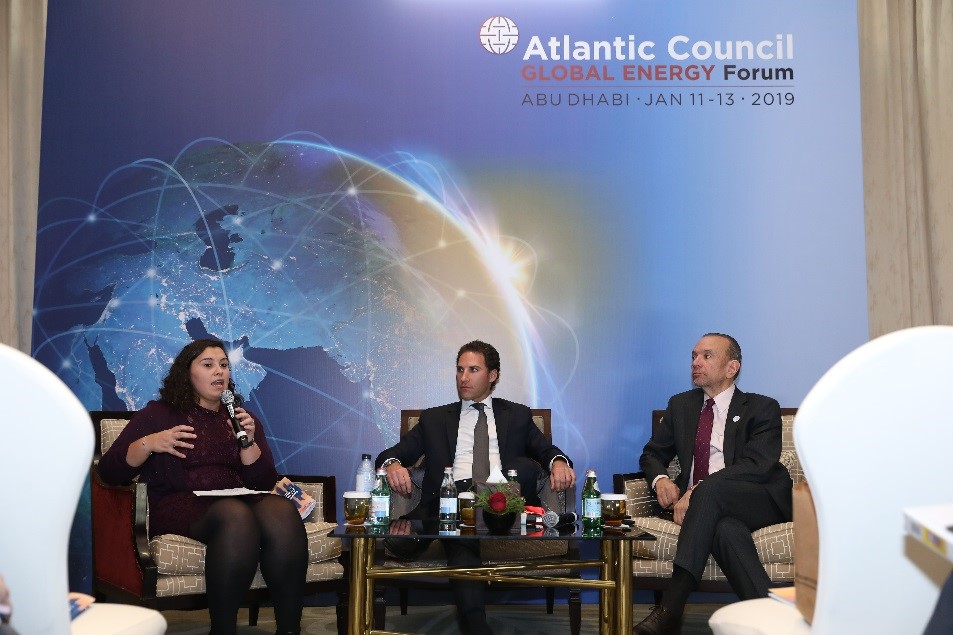
Sovereign wealth funds (SWF)—pillars of hydrocarbon exporting countries in the Middle East—are often stifled by weak governance and poor transparency. In a discussion of Bina Hussein’s report, panelists offered insight from Singapore, a country that—like many Middle Eastern countries—struggles with a large population and lack of human capital knowledge, but nonetheless succeeded in diversifying its economy and increasing funding transparency.
REPORT LAUNCH 2: MEETING EAST ASIAN LNG DEMAND
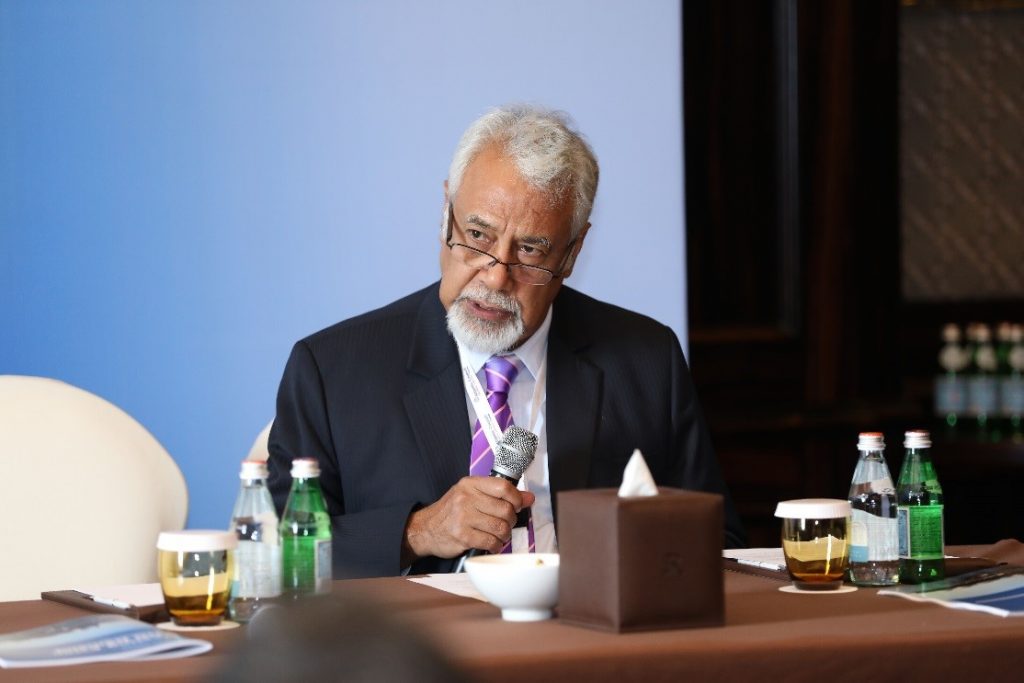
Keynote by: H.E. Kay Rala Xanana Gusmão, Chief Negotiator for Maritime Boundaries, Maritime Boundary Office, Council for the Final Delimitation of Maritime Boundaries, Democratic Republic of Timor-Leste
Discussants:
Robert Fee, Vice President for International Affairs and Commercial Development, Cheniere Energy
Ken Koyama, Managing Director, Chief Economist, Strategy Research Unit, The Institute of Energy Economics, Japan
Jean-Francois Seznec, Senior Fellow, Global Energy Center, Atlantic Council
Moderated by: Melanie Kenderdine, Senior Fellow, Global Energy Center, Atlantic Council; Principal, Energy Futures Initiative
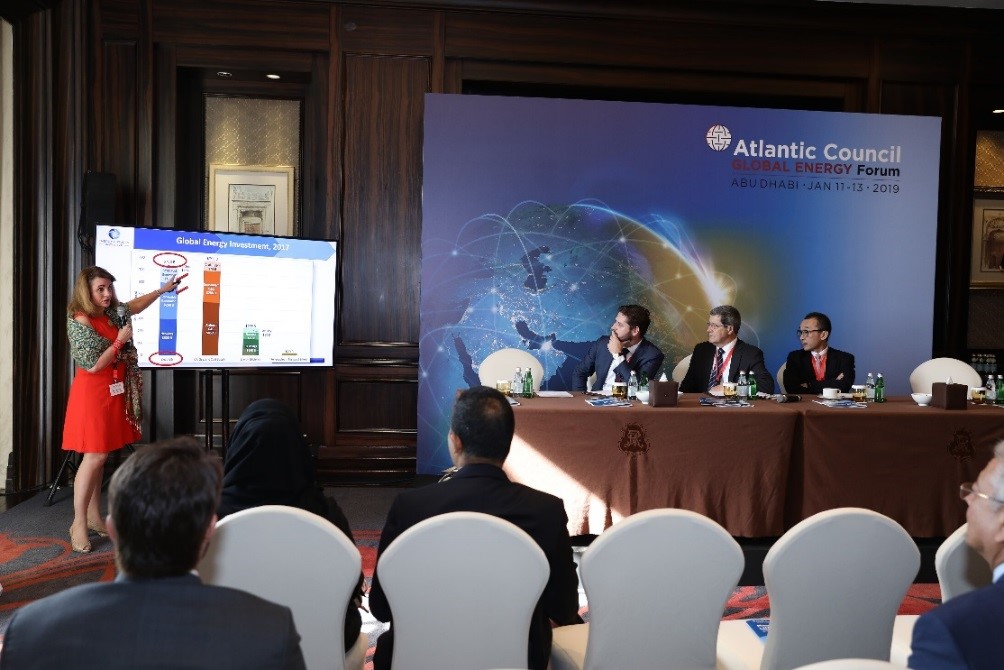
In a discussion of Jean-Francois Seznec’s report, panelists emphasized the key role natural gas will play in meeting East Asian energy demand, citing US development of the Asian energy sector and Middle East LNG imports as catalysts and tariffs as inhibitors. They noted that LNG adoption would depend on the seriousness with which Asian countries addressed pollution and energy portfolio diversification and suggested cost incentive policies—namely subsidies—to increase LNG competitiveness.
BREAKOUT DISCUSSION: THE GEOPOLITICS OF PEAK OIL DEMAND
Robert Johnston, Senior Fellow, Global Energy Center, Atlantic Council and Chief Executive Officer, Eurasia Group
Chris Midgley, Head, Analytics Content, S&P Platts
Axel Pierru, Interim Vice President for Research, King Abdullah Petroleum Studies & Research Center
Yukari Yamashita, Board Member and Director, Charge of Energy Data and Modeling Center, The Institute of Energy Economics, Japan
Moderated by: Randolph Bell, Director, Global Energy Center, Atlantic Council
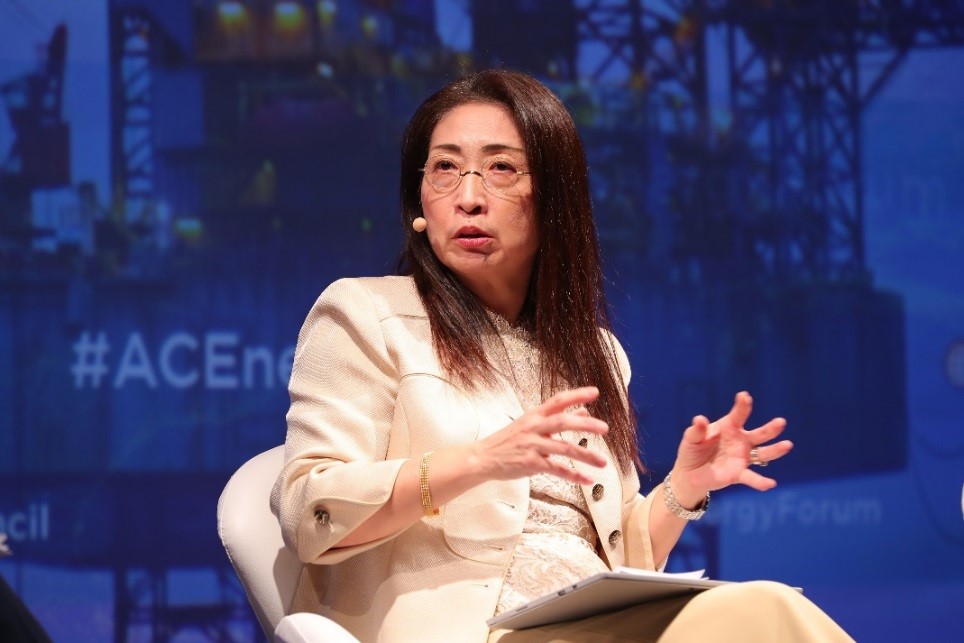
Panelists addressed critical questions about winners and losers of a decline in oil demand and how countries could mitigate risk. They highlighted China as a leader in managing the energy transition and advised that countries with significant oil interests invest in downstream commodities such plastics and petrochemicals to remain relevant in a less oil-dependent future.
US FOREIGN ENERGY POLICY IN THE MIDDLE EAST AND ASIA
Francis R. Fannon, Assistant Secretary, Bureau of Energy Resources, United States Department of State
Moderated by: Paula Dobriansky, Senior Fellow, The Future of Diplomacy Project, JFK Belfer Center for Science and International Affairs, Harvard University
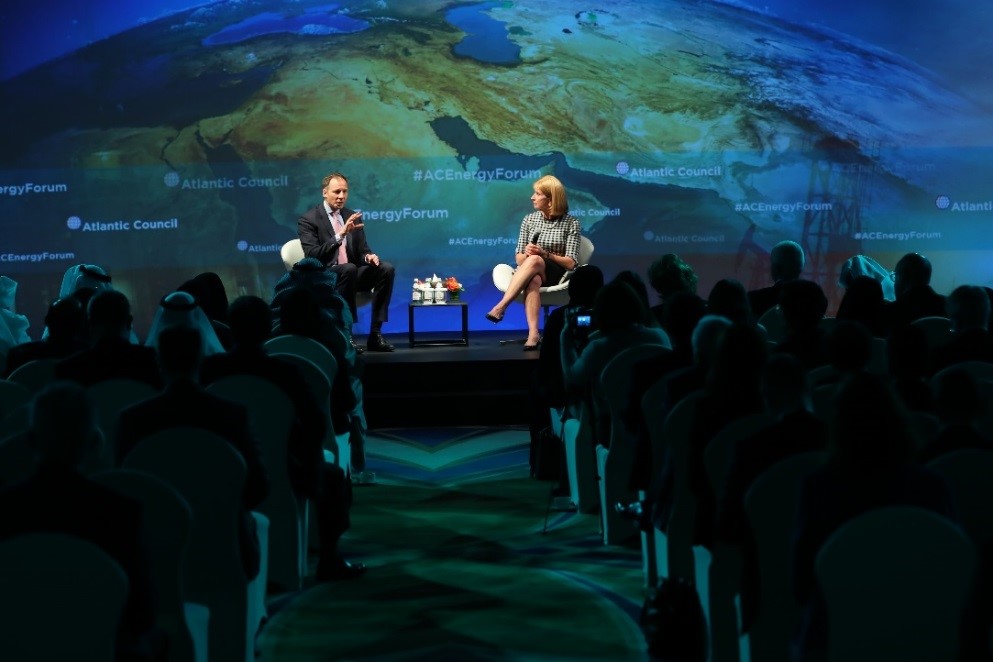
Francis Fannon and Paula Dobriansky leveraged their diplomatic and energy policy experience to address the mission of the US’s Asia EDGE, energy alliances in the Middle East and Indo-Pacific, and pillars of free trade, and resource sharing. Acknowledging the inability to apply a “catch-all” plan for the Middle East and Indo-Pacific region, they called on governments and private companies to work together to facilitate investment and drive innovation in clean technology, nuclear energy, and energy efficiency.
DIVERSIFICATION: CORPORATE AND COUNTRY STRATEGIES FOR CHANGE
Musabbeh Al-Kaabi, Chief Executive Officer, Petroleum & Petrochemicals, Mubadala Investment Company
Claudio Descalzi, Chief Executive Officer, Eni
Moderated by: Frederick Kempe, President and CEO, Atlantic Council
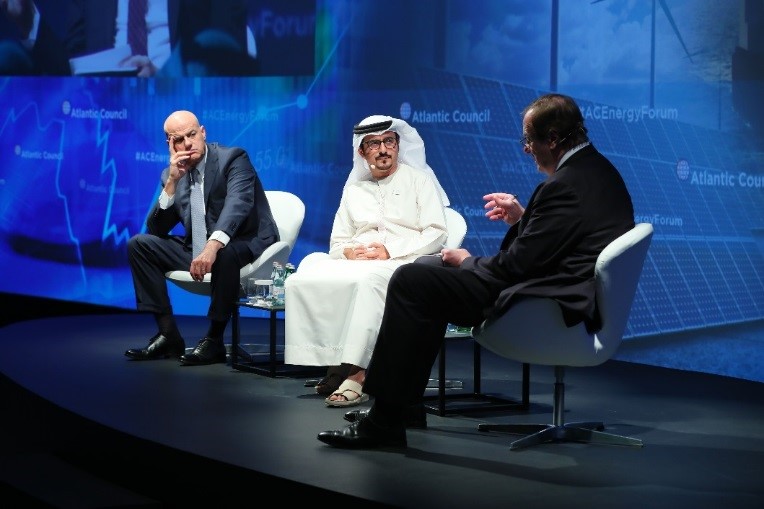
In a frank conversation, Musabbeh Al-Kaabi and Claudio Descalzi evaluated oil company strategies that had successfully safeguarded shareholder value through investment in renewables, natural gas, nuclear, and downstream commodities. They cited Eni’s investment in African natural gas and Mubadala’s expansion into renewables, aerospace, and information technology as examples of companies’ abilities to prepare for peak oil by diversifying their supply chains.
ENERGY 2050: ENERGY AND GEOPOLITICAL MODELING UNDER DEEP UNCERTAINTY
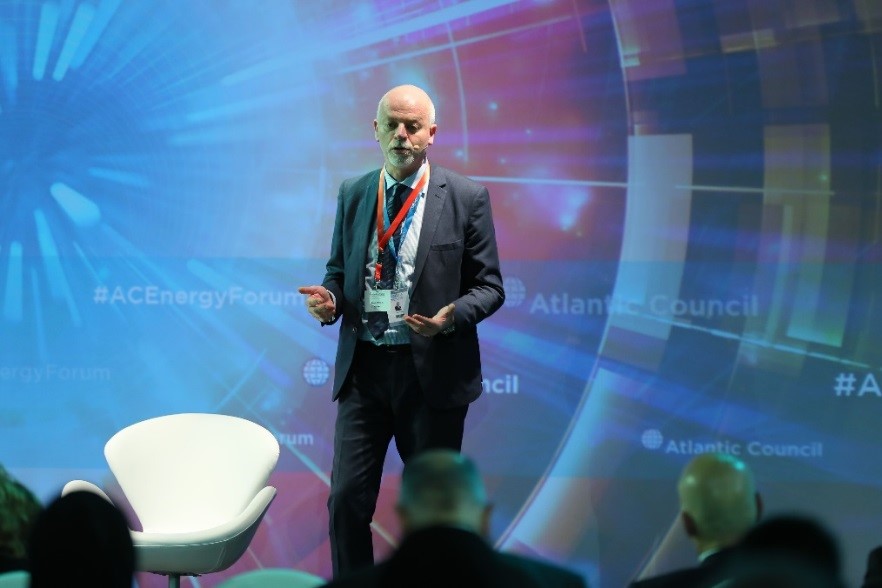
Introductory remarks by:
Frederick Kempe, President and CEO, Atlantic Council
Lapo Pistelli, Executive Vice President, International Affairs, Atlantic Council
Presented by:
Randolph Bell, Director, Global Energy Center, Atlantic Council
Erik Pruyt, Associate Professor of Model-Based Policy Analysis and Head of the Policy Modelling Lab, Technische Universiteit Delft
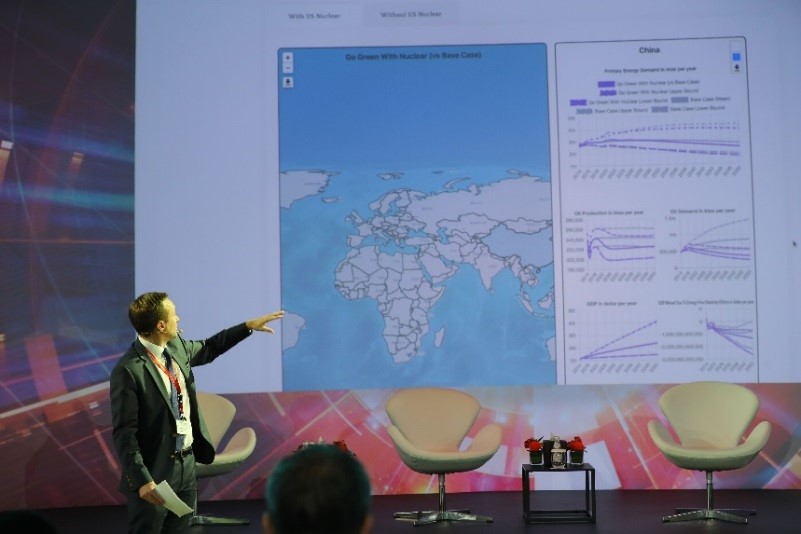
In their demonstration of Global Energy 2050: Projections Under Deep Uncertainty—an Atlantic Council model developed with Eni’s support—Randolph Bell and Erik Pruyt predicted the geopolitical impacts of energy scenarios at national, regional, and global levels over various time horizons. The presentation showcased the model’s ability to evaluate the impact of future energy mixes on political, economic, and energy market stability.
INNOVATION PRESENTATION: 5G IN THE POWER SECTOR: MAKING THE SMART GRID SMARTER
Terry Halvorsen, Chief Information Officer and Executive Vice President, IT and Mobile Business to Business, Samsung Electronics
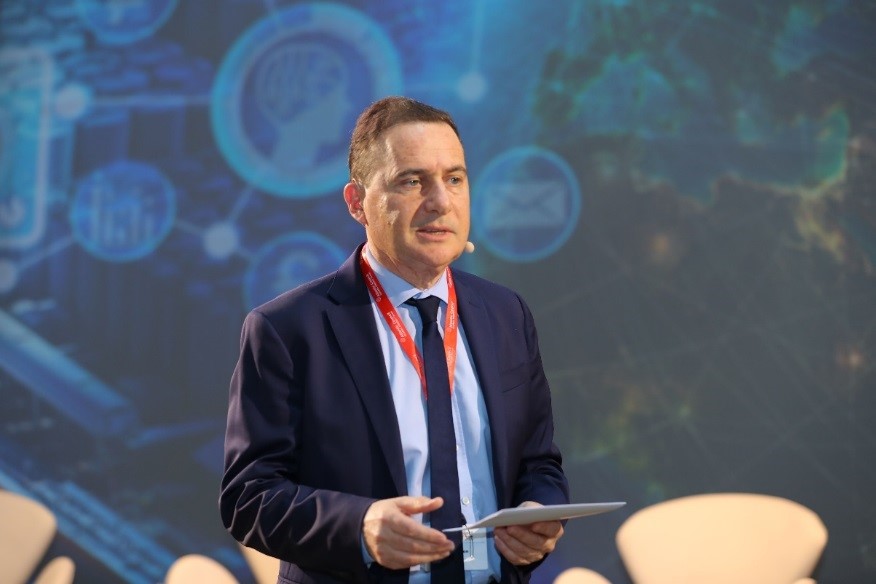
As 5G connectivity becomes available for industrial and consumer use, it has strong potential to bolster efficiency in energy distribution and protection against cybersecurity threats. In his presentation, Terry Halvorsen marketed the benefits of 5G in the energy sector, citing real time AI processing for increased power efficiency and security from hostile infiltration in an increasingly interconnected grid.
POWER SECTOR FUELS OF THE FUTURE: COMPETITION OR COOPERATION?
H.E. Eng. Fatima Al-Foora Al Shamsi, Assistant Undersecretary for Electricity and Future Energy Affairs, Ministry of Energy and Industry, United Arab Emirates
Bader Al Lamki, Executive Director, Masdar Clean Energy
Meg Gentle, President and CEO, Tellurian Inc.
Dan Poneman, President & CEO, Centrus Energy Corp.
Yongsoo Huh, President and CEO, GS Energy
Moderated by: David Goldwyn, Chairman, Energy Advisory Group, Global Energy Center, Atlantic Council
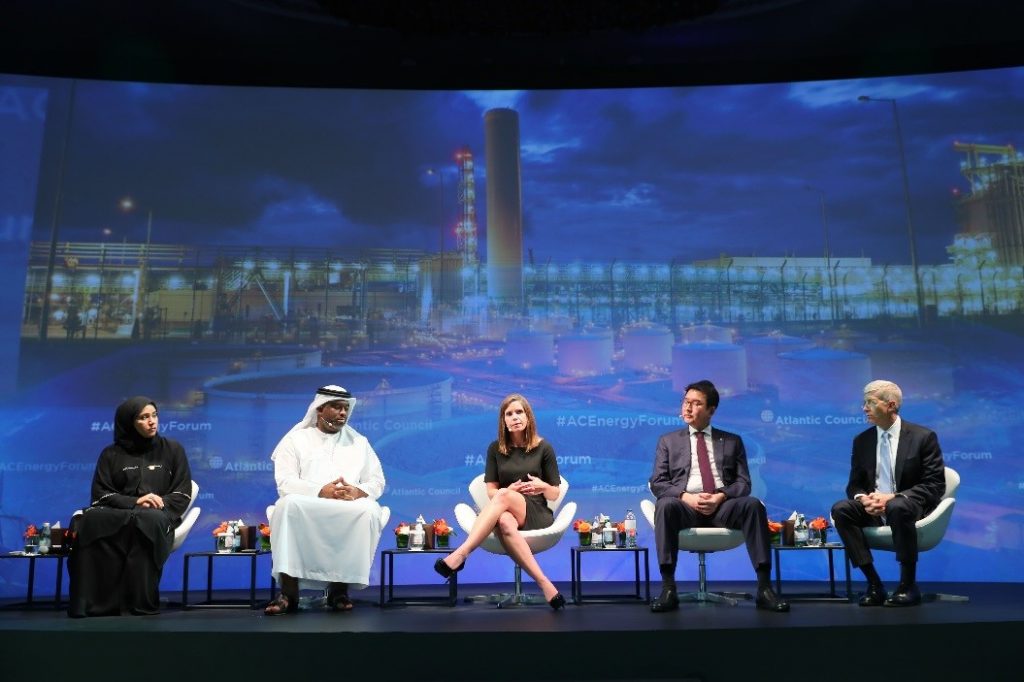
Decarbonization of the energy system requires a resilient and complementary mix of renewables, advanced energy, and natural gas. Despite potential for cooperation across the energy sector, uncertainty remains over the role of LNG and advanced nuclear technology. Panelists acknowledged that climate pressures would likely lead to nuclear innovation, particularly in the realm of desalination and biofuel generation, but expressed concern over cost and safety constraints.
INNOVATION PRESENTATION: SMART REACTOR AND THE FUTURE OF SMRS
Kim Keung-Koo, Vice President, SMART Development, Korea Atomic Energy Research Institute
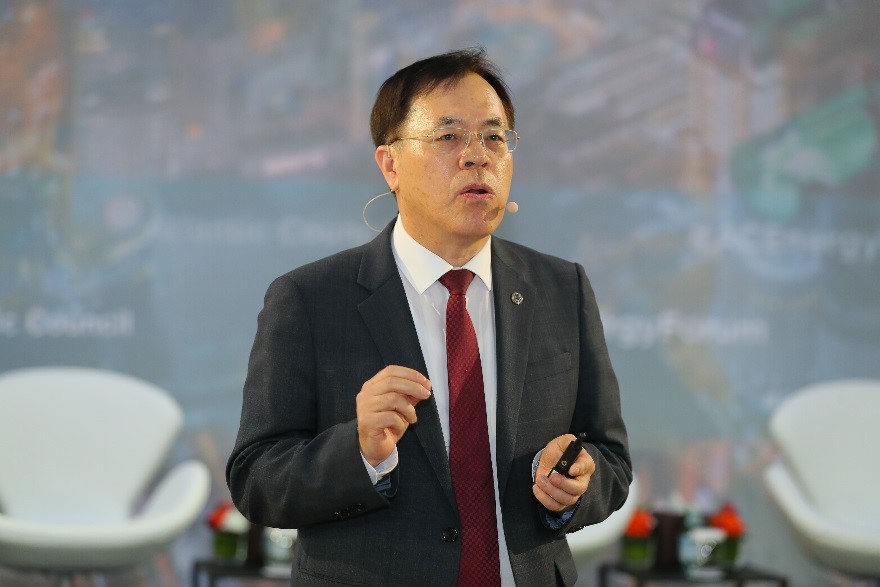
Small Modular Reactors (SMRs) and System-integrated Modular Advanced Reactors (SMART) decrease nuclear safety risks and enhance power grid reliability. In his innovation presentation, Kim Keung-Koo argued that these technologies—with their shorter development times and updated safety features—were more cost effective and easily distributed and provided the secondary benefit of desalination. Despite promising developments, Kim admitted that investment and installation risks could cause delays.
NUCLEAR ENERGY: NEW ACTORS, NEW TECHNOLOGIES, AND NEW GEOPOLITICS
Mohamed Al Hammadi, Chief Executive Officer, Emirates Nuclear Energy Corporation
Maher Al Odan, Chief Atomic Energy Officer, King Abdullah City for Atomic and Renewable Energy
Nobuo Tanaka, Chairman, Sasakawa Peace Foundation
The Hon. Ellen Tauscher, former Under Secretary for Arms Control and International Security Affairs, US Department of State
Moderated by: David Scott, Founder and President, Investment Diplomacy Group
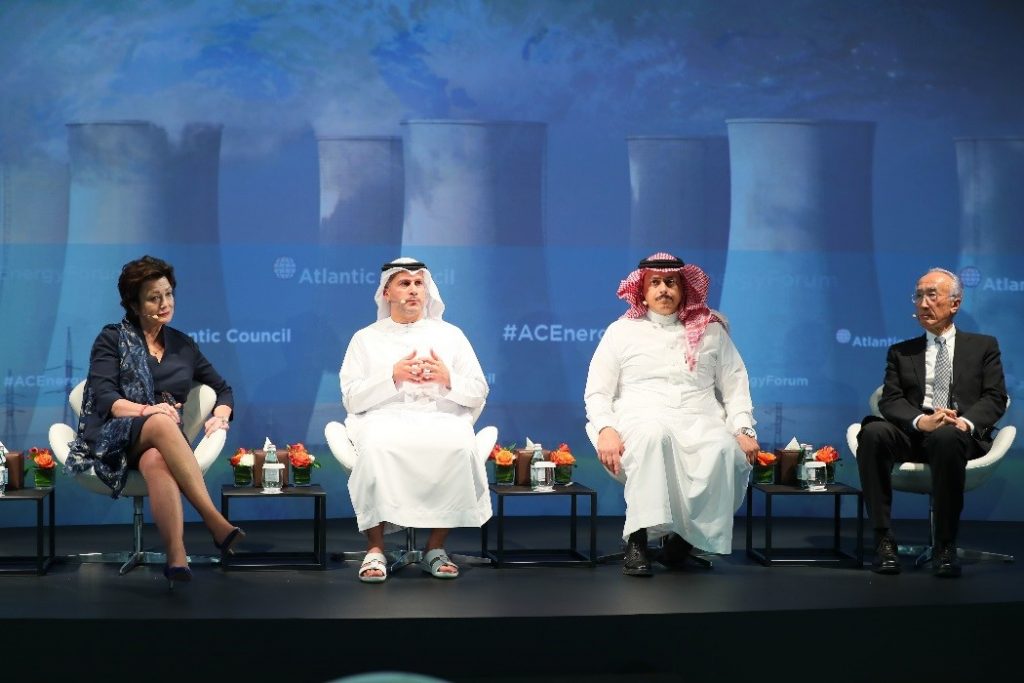
In a discussion of prospects for nuclear innovation, panelists debated the merits of new nuclear technology alongside other clean energy sources. Although small modular, light-water, and travelling wave reactors provide small scale, safe, and sustainable nuclear power, the future of nuclear remains threatened by widespread skepticism of safety standards and renewable energy sources that have the potential to outperform and outprice nuclear.
NIGHT OWL: THE TRUMP EFFECT ON OIL MARKETS (off-the-record)
David Hobbs, Senior Fellow, Global Energy Center, Atlantic Council
Thomas Marchetti, President, Energy Intelligence
Chris Midgley, Head, Analytics Content, S&P Platts
Moderated by: Eithne Treanor, Managing Director, E.Treanor Media
US President Donald Trump has intervened in global markets in surprising and unprecedented ways during his first two years in office. Not least of these interventions are his regular comments on Twitter about OPEC and his desire to keep oil prices low. In their evaluation of Trump’s effect on oil markets, panelists discussed the ability of US energy policy to shape the oil market in 2019.
Sunday, January 13
AN UPDATE ON SAUDI VISION 2030 & THE OIL MARKET
H.E. Khalid Al-Falih, Minister of Energy, Industry, and Mineral Resources, Kingdom of Saudi Arabia
Moderated by: Frederick Kempe, President and CEO, Atlantic Council
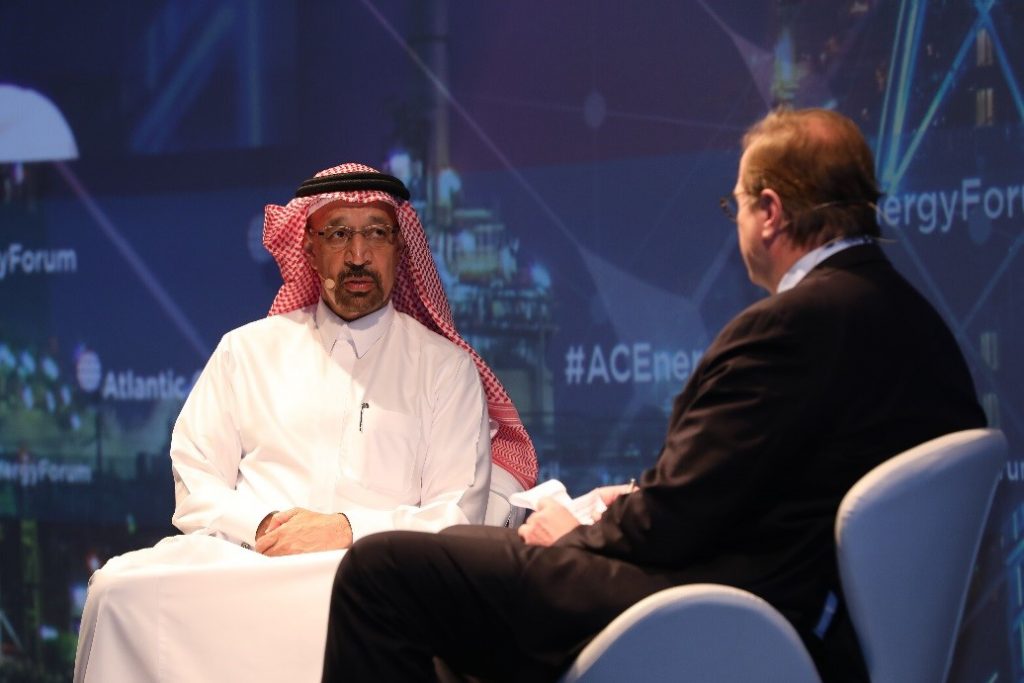
H.E. Khalid Al-Falih presented an update on Saudi Vision 2030, highlighting Saudi Arabia’s success in energy portfolio diversification and housing market investments. He cited downstream refining, natural gas production, solar development, and carbon capture and storage technologies as key activities supporting Saudi Arabia’s leadership in sustainability and low-carbon energy production.
INNOVATION PRESENTATION: ZERO EMISSIONS FOSSIL FUELS
Bill Brown, Chief Executive Officer, NET Power
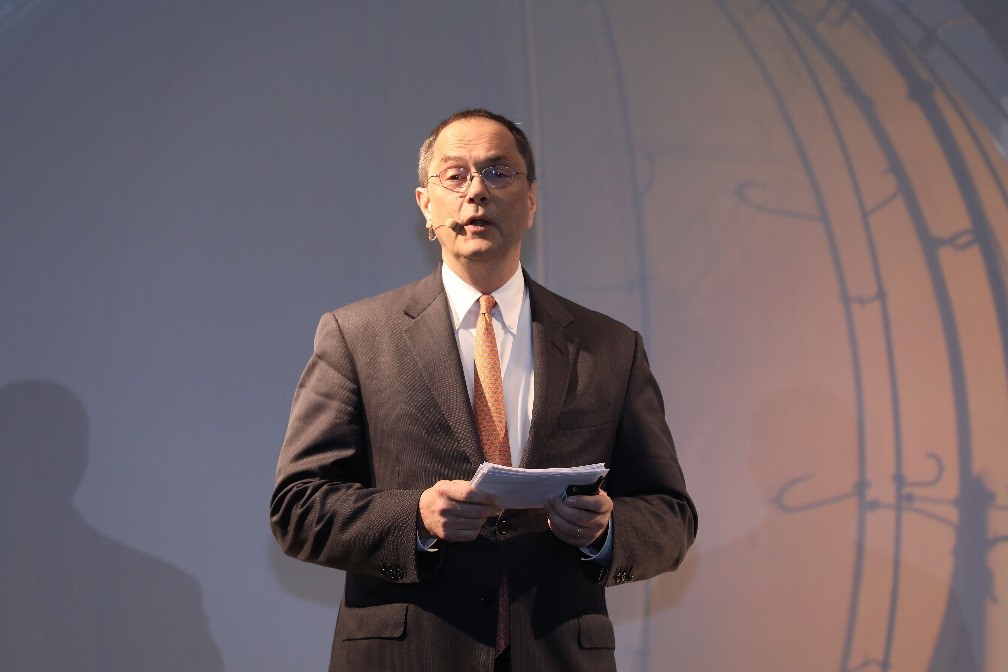
Carbon capture and hydrogen fuel production may draw criticism for their high costs, but Bill Brown promises net zero emissions, low water usage, and carbon capture at an affordable price with NET Power’s oxy-combustion technology. In his presentation, Brown discussed the potential to substitute natural gas for hydrogen and fuel transportation at a cost of fifty cents per kilogram of hydrogen.
DECARBONIZATION OF OIL AND GAS
Ahmad Al Khowaiter, Chief Technology Officer, Saudi Aramco
Jerome Schmitt, Executive Committee Chairman, Oil & Gas Climate Initiative
Adnan Shihab-Eldin, Director General, Kuwait Foundation for the Advancement of Sciences
Masakazu Toyoda, Chairman and CEO, The Institute of Energy Economics, Japan
Mechthild Wörsdörfer, Director for Sustainability, Technology, and Outlooks, International Energy Agency
Facilitated by: Akshat Rathi, Reporter, Quartz
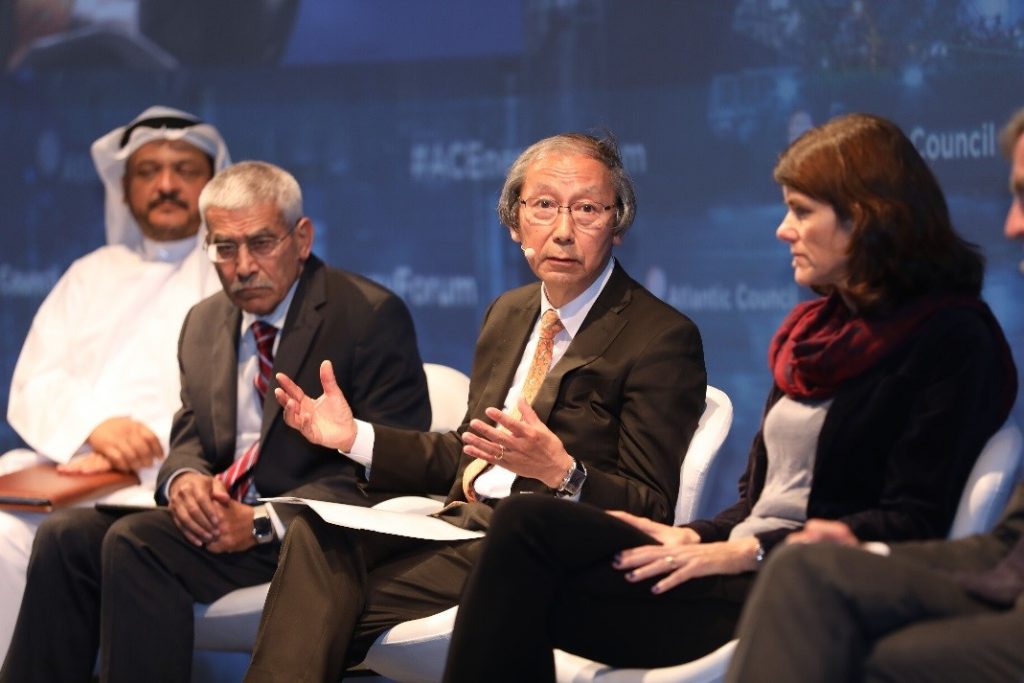
Akshat Rathi opened the discussion with the point that fossil fuel usage had remained stable despite growth in clean energy sources. In their response, panelists suggested that countries decarbonize their energy systems through measures such as Saudi Arabia’s elimination of gas flaring and decrease in water usage for oil extraction. They asserted that cutting-edge startups and research projects were vital in driving innovation in carbon capture and storage (CCS) and hydrogen conversion.
BELT AND ROAD: ENERGY, ENVIRONMENT, ECONOMICS, AND GEOPOLITICS
Mike Eckhart, Managing Director and Global Head of Environmental Finance and Sustainability, CitiGroup
Han Wenke, Senior Fellow, Energy Research Institute, National Development and Reform Commission
Paddy Padmanathan, President and CEO, ACWA Power
Amb. Ali Siddiqui, Advisor, JS Group
Aida Sitdikova, Director, Energy & Natural Resources, Russia, Caucasus, and Central Asia, European Bank for Reconstruction and Development
Moderated by: Hadley Gamble, Reporter and Anchor, CNBC
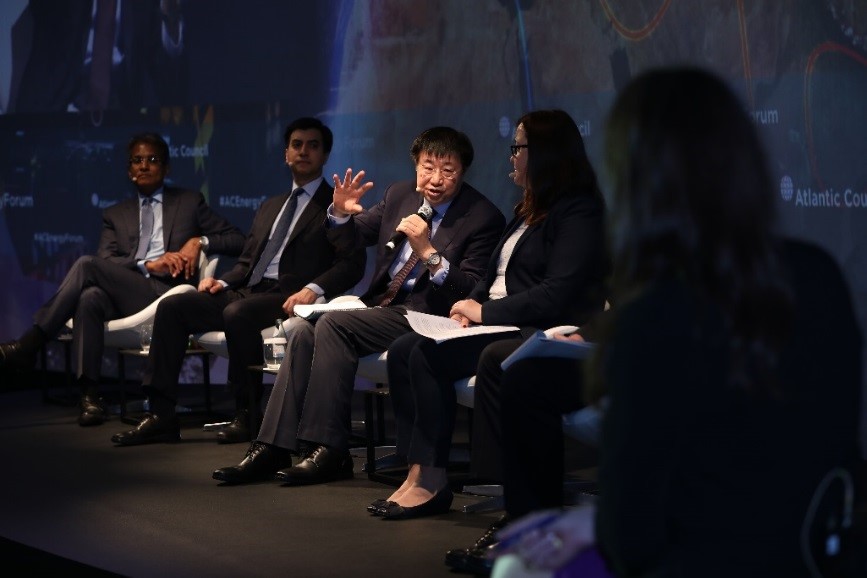
The Belt and Road Initiative (BRI)—which uses infrastructure development to link China to over sixty countries—has already impacted countries such as Pakistan, whose citizens have witnessed job growth as a result of heavy Chinese investment. Panelists dispelled the myth of China’s willingness to invest in unprofitable projects for the sake of garnering regional influence, arguing that China exhibited pragmatic investment strategy that simultaneously increased the competitiveness of advanced energy.
BREAKOUT SESSIONS
REPORT LAUNCH 3: FROM PARIS TO BEIJING: IMPLEMENTING THE PARIS AGREEMENT IN THE PEOPLE’S REPUBLIC OF CHINA
Craig Hart, Senior Fellow, Global Energy Center, Atlantic Council
Wang Tao, China Strategist, Climate Works Foundation
Wang Zhongying, Director General, Energy Research Institute, National Development and Reform Commission
Moderated by: Jennifer Gordon, Deputy Director, Global Energy Center, Atlantic Council
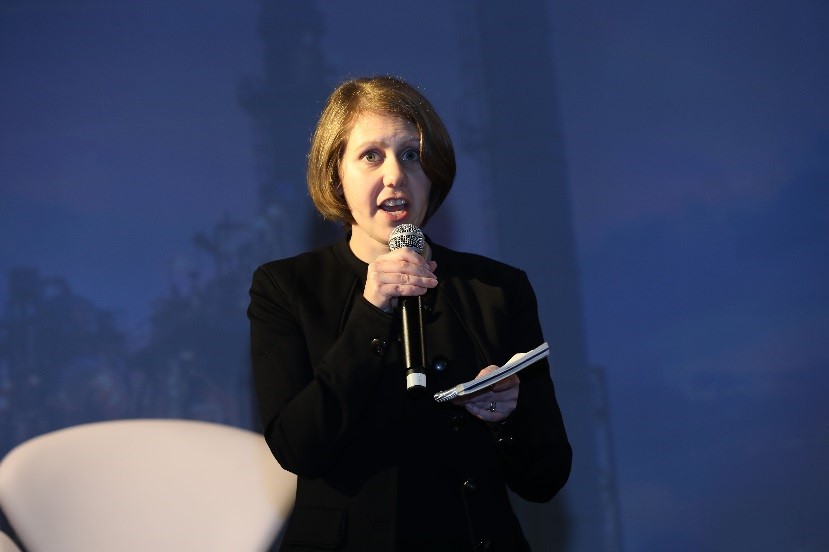
Using Craig Hart’s report as a focal point, panelists evaluated challenges and opportunities for China’s fulfillment of its 2016 Paris Agreement climate commitments. Despite the positive impact of renewables investment and subsidies, panelists cited poor transparency and lack of reliable data tracking as threats to the enforcement of climate commitments. Panelists suggested that non-governmental organizations play a role in driving government reform, given their influence in Chinese policy circles.
REPORT LAUNCH 4: THE ENERGY TRANSITION: CORPORATE ADAPTATION STRATEGIES
Todd Glass, Partner, Wilson Sonsini Goodrich & Rosati
David Koranyi, Senior Fellow for Energy Diplomacy, Global Energy Center, Atlantic Council
Daniel Litvin, Founder and Managing Director, Critical Resource
Jerome Schmitt, Executive Committee Chairman, Oil & Gas Climate Initiative
Moderated by: Eithne Treanor, Managing Director, E.Treanor Media
David Koranyi and his fellow panelists explored key oil company adaptation strategies in the wake of the energy transition. While investor pressure and customer preference for green energy were driving renewables growth, major US companies still used conservative emissions estimates and invested less the ten percent on non-oil and gas research and development. Panelists called for more immediate action, specifying climate change education and carbon capture and storage as key areas of improvement.
REPORT LAUNCH 5: READY FOR TAKEOFF? AVIATION BIOFUELS PAST, PRESENT, AND FUTURE
Linden Coppell, Head of Sustainability, Etihad Airways
Jennifer Holmgren, Chief Executive Officer, LanzaTech
Jeffrey Skeer, Senior Programme Officer, Technology Co-Operation (Bioenergy), International Renewable Energy Agency
Moderated by: David Hitchcock, Affiliate, Mabus Group
David Hitchcock, author of the report “Ready for Take Off? Aviation Biofuels Past, Present, and Future,” moderated a panel exploring the sustainable benefits, logistics, and distribution of biofuels. With biofuels raising concerns of food insecurity, poor sustainability, and limited land resources, panelists explored opportunities for creative biofuel growth strategies, carbon taxes on passengers and airlines, and the use of biomass waste as a fuel source.
INNOVATION PRESENTATION: BLOCKCHAIN: SECURING THE OIL AND GAS SUPPLY CHAIN
Eric Besson, Advisor to the CEO, SICPA
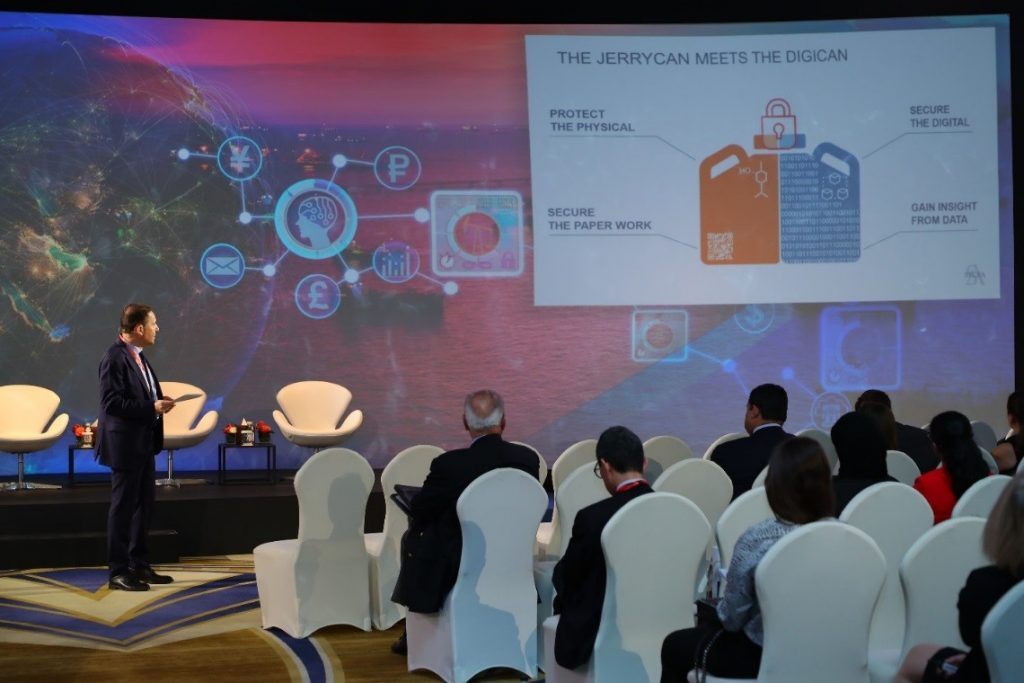
In his discussion of the cutting-edge security possibilities of blockchain, Eric Besson highlighted the data and transaction-tracking capabilities of the nascent technology in oil and gas supply chains. He asserted that blockchain’s security and information tracking mechanisms were particularly useful in tracking oil theft and supply chain weak spots. According to Besson, blockchain both reinforced existing security measures and optimized supply side transportation for greater efficiency gains across the market.
21st CENTURY ENERGY SECURITY: RISK AND REWARD
Amos Hochstein, Senior Vice President, Marketing, Tellurian Inc.
David Livingston, Deputy Director, Climate and Advanced Energy, Atlantic Council
Xiansheng Sun, Secretary General, International Energy Forum
Yukari Yamashita, Board Member and Director, Charge of Energy Data and Modeling Center, The Institute of Energy Economics, Japan
Moderated by: Richard Morningstar, Founding Chairman, Global Energy Center, Atlantic Council

Panelists shared concerns of cybersecurity threats posed by renewables penetration, China’s disproportionate share of mining and refining markets, and management of the fuel mix as renewable and advanced energy replaces coal. Even as energy markets democratize and private entities lead global market innovation, panelists argued, a sub-two-degree Celsius climate future required heavy public investment in research and development, particularly in the field of carbon capture.
INNOVATION PRESENTATION: THE DIGITAL TRANSFORMATION OF THE OILFIELD
Fady Sleiman, Chief Digital Officer, Petrofac
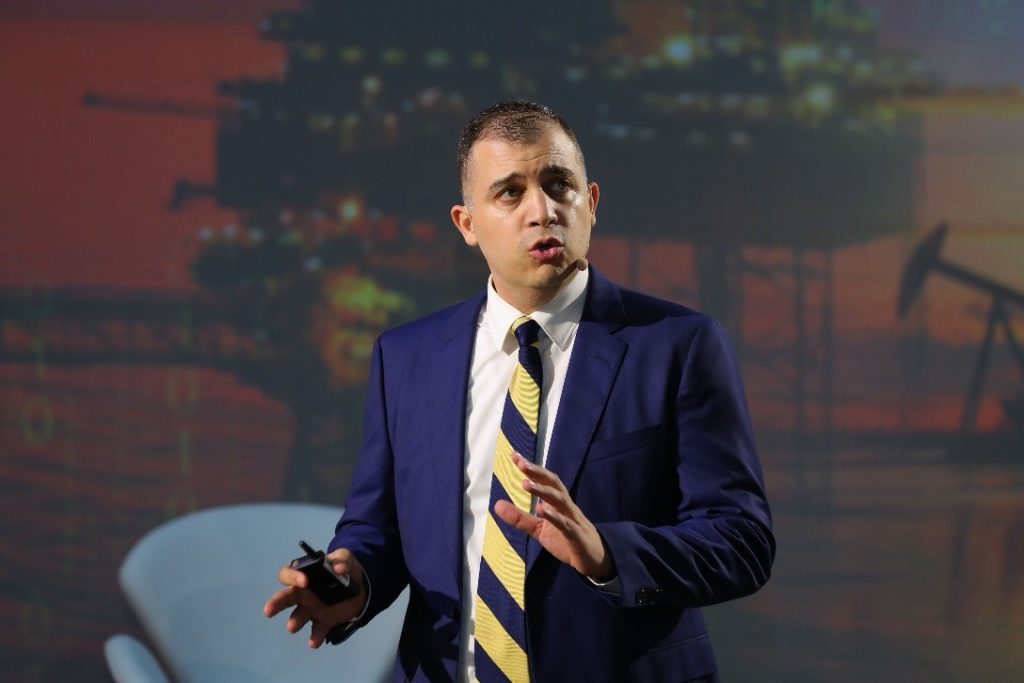
In his presentation on the transformation of the energy business through digitized data, Fady Sleiman identified three core concepts to which a company could digitalize the oil supply chain: culture, productivity, and customer. As new technologies spurred oil industry integration with quicker, smarter, and more cost-efficient information sharing methods, Sleiman asserted, all levels of leadership needed to complete system optimization through digital integration.
THE FUTURE OF SHALE: THE US AND BEYOND?
Thomas Earl, Chief Commercial Officer, Venture Global LNG
Thomas Marchetti, President, Energy Intelligence
Adam Sieminski, President, King Abdullah Petroleum Studies & Research Center
Moderated by: Jennifer Gnana, Energy Reporter, The National
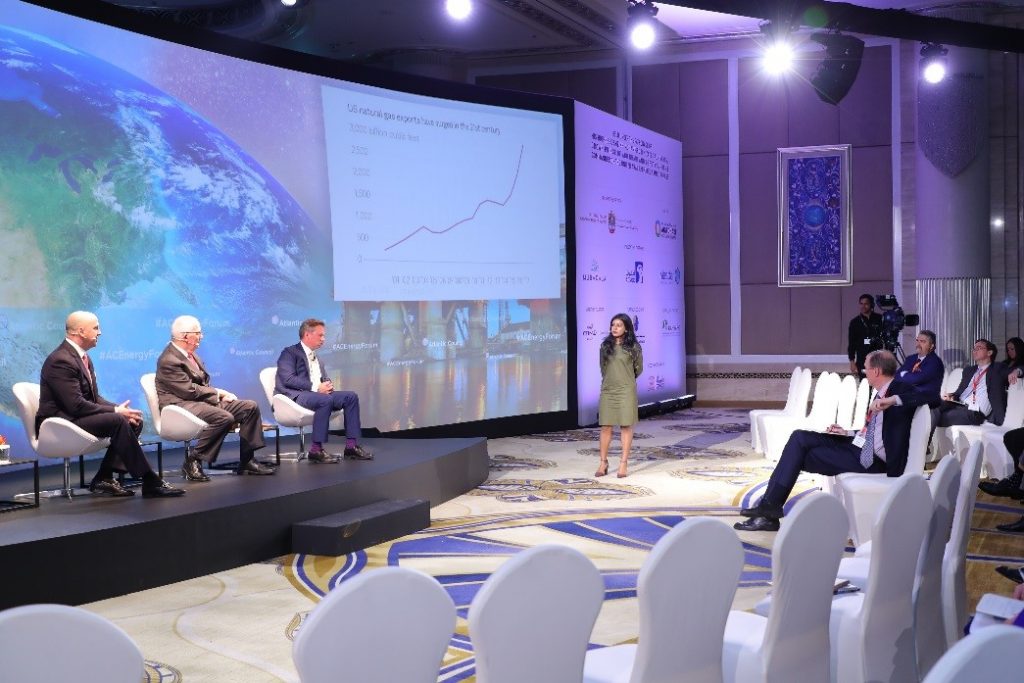
Discussing the newly released Atlantic Council report, “The Future of Shale: The US Story and Its Implications,” panelists predicted that shale growth and exports to East Asia would remain strong, largely as a result of private companies’ ability to conduct deals independent of government-led efforts. They were also definitive in their assessment of crude oil: although it would fail to be as profitable as LNG due to an already crowded market, refining abilities could provide alternative revenue sources.
LOOKING AHEAD: THE FUTURE OF THE VIENNA ALLIANCE
H.E. Mohammed Barkindo, Secretary General, Organization of the Petroleum Exporting Countries
H.E. Suhail Al Mazrouei, Minister of Energy and Industry, United Arab Emirates
Moderated by: Helima Croft, Managing Director and Global Head of Commodity Strategy, Global Research, RBC Capital Markets
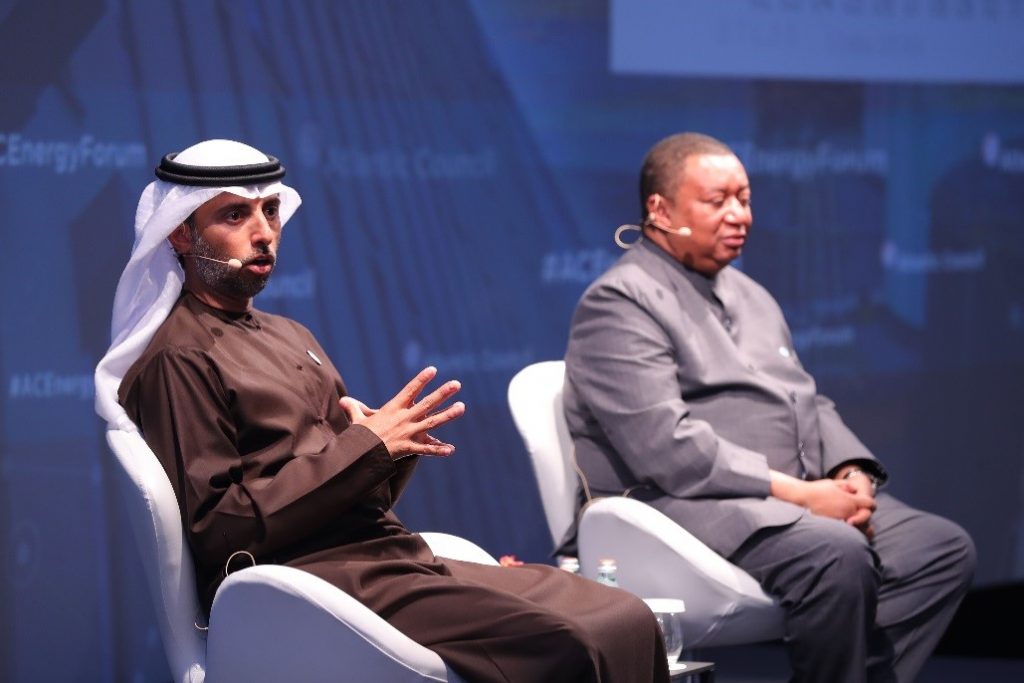
Secretary General Mohammed Barkindo and H.E. Suhail Al Mazrouei used their first-hand knowledge of OPEC production cuts and regional market trends to address the impact of oil market volatility on oil prices. They framed OPEC production cuts as a response to this volatility that was partly driven by US shale production. They also addressed OPEC’s relationship with Russia, offering that the Vienna alliance should play a role in promoting cooperation between OPEC and non-OPEC countries.
Subscribe to our newsletter
Sign up to receive our weekly DirectCurrent newsletter to stay up to date on the program’s work.
Follow us on social media